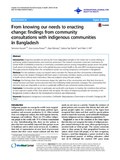| dc.contributor.author | Hussain, Sameera | |
| dc.contributor.author | Ruano, Ana Lorena | |
| dc.contributor.author | Rahman, Atiya | |
| dc.contributor.author | Rashid, Sabina Faiz | |
| dc.contributor.author | Hill, Peter S. | |
| dc.date.accessioned | 2016-05-05T16:43:59Z | |
| dc.date.available | 2016-05-05T16:43:59Z | |
| dc.date.copyright | 2015 | |
| dc.date.issued | 2015-06 | |
| dc.identifier.citation | Hussain, S., Ruano, A. L., Rahman, A., Rashid, S. F., & Hill, P. S. (2015). From knowing our needs to enacting change : findings from community consultations with indigenous communities in Bangladesh. International Journal for Equity in Health, 1–9. http://doi.org/10.1186/s12939-015-0264-x | en_US |
| dc.identifier.issn | 1475-9276 | |
| dc.identifier.uri | http://hdl.handle.net/10361/5238 | |
| dc.description | Includes bibliographical references (page 9-10). | |
| dc.description.abstract | Introduction: Indigenous peoples are among the most marginalized peoples in the world due to issues relating to
well-being, political representation, and economic production. The research consortium Goals and Governance for
Global Health (Go4Health) conducted a community consultation process among marginalized groups across the global
South aimed at including their voices in the global discourse around health in the post-2015 development agenda.
This paper presents findings from the consultations carried out among indigenous communities in Bangladesh.
Methods: For this qualitative study, our research team consulted the Tripura and Mro communities in Bandarban
district living in the isolated Chittagong Hill Tracts region. Community members, leaders, and key informants working
in health service delivery were interviewed. Data was analyzed using thematic analysis.
Findings: Our findings show that remoteness shapes the daily lives of the communities, and their lack of access to
natural resources and basic services prevents them from following health promotion messages. The communities feel
that their needs are impossible to secure in a politically indifferent and sometimes hostile environment.
Conclusion: Communities are keen to participate and work with duty bearers in creating the conditions that will lead
to their improved quality of life. Clear policies that recognize the status of indigenous peoples are necessary in the
Bangladeshi context to allow for the development of services and infrastructure. | en_US |
| dc.description.statementofresponsibility | Sameera Hussain | |
| dc.description.statementofresponsibility | Ana Lorena Ruano | |
| dc.description.statementofresponsibility | Atiya Rahman | |
| dc.description.statementofresponsibility | Sabina Faiz Rashid | |
| dc.description.statementofresponsibility | Peter S. Hill | |
| dc.format.extent | 10 pages | |
| dc.language.iso | en | en_US |
| dc.publisher | International Journal for Equity in Health | en_US |
| dc.rights | BRAC University Journals are protected by copyright. They may be viewed from this source for any purpose, but reproduction or distribution in any format is prohibited without written permission. | |
| dc.subject | Bangladesh | en_US |
| dc.subject | Indigenous communities | en_US |
| dc.subject | Go4Health | en_US |
| dc.subject | Marginalization | en_US |
| dc.subject | Determinants of health | en_US |
| dc.subject | Chittagong hill tracts | en_US |
| dc.title | From knowing our needs to enacting change: findings from community consultations with indigenous communities in Bangladesh | en_US |
| dc.type | Article | en_US |
| dc.contributor.department | James P Grant School of Public Health, BRAC University | |

